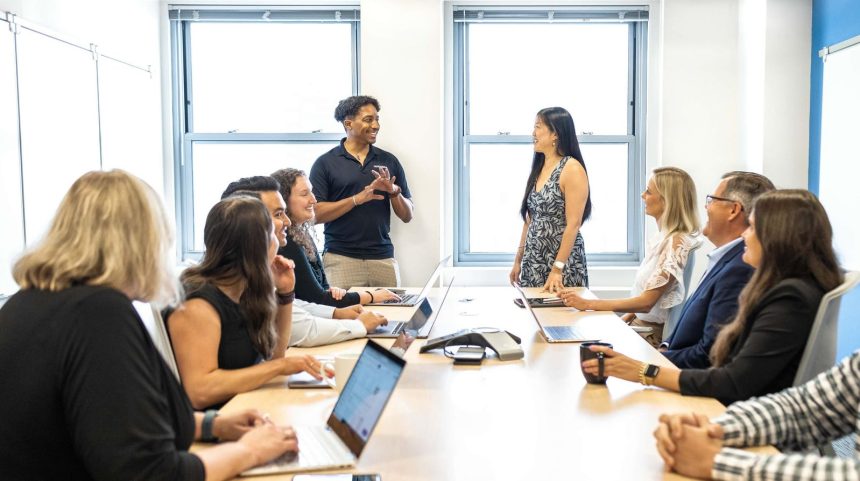Pariveda, a consulting firm founded by Bruce Ballengee, centers its business model around the development and empowerment of its employees through innovative organizational frameworks such as Employee Stock Ownership Plans (ESOPs) and B Corp certification. During discussions with key leaders, including Ballengee, Margaret Rogers (CEO), and Tiffany Lentz (VP), the conversation revolved around the importance of employee development in driving meaningful change in companies. Bruce highlighted the risk that many organizations face; they become overly focused on immediate issues and neglect the deeper, systemic challenges—what he refers to as the “iceberg” of issues underneath the surface. Pariveda’s commitment to a people-centric business model aims to alleviate this myopic approach by nurturing talent and promoting self-organization, thus allowing their staff to thrive and lead in rapid-paced environments.
In 2003, Pariveda made a pivotal decision to establish an ESOP three years after its founding, aligning employee ownership with its mission to foster people development. The ESOP model has been shown to enhance productivity, employee retention, and overall job satisfaction—benefits that have positioned Pariveda favorably in the consulting landscape. Bruce explained that while ownership models like ESOPs are underused by companies—primarily due to owners fearing loss of control or the desire to “cash out”—Pariveda sought to create a new narrative. They believe the prevailing myth of limited opportunity fails to recognize a wealth of potential for innovation. By viewing the challenges presented in their industry as opportunities for broader engagement, Pariveda strives to address concealed problems, paralleling the idea of treating the root causes of issues rather than merely alleviating symptoms.
Margaret Rogers reflected on her journey to join Pariveda and the consistent focus on developing potential that initially drew her in. Throughout her tenure, she witnessed the organization’s commitment to authenticity and transparency, which differed markedly from the traditional consulting firms she had previously worked with. Both Rogers and Lentz emphasized the proactive, client-oriented approach Pariveda employs in their diverse engagements, such as rebranding projects. For instance, Pariveda’s work with Cadiz, a California-based water solutions company, highlighted the importance of aligning a brand with its mission and values. By repositioning Cadiz’s branding, the firm didn’t merely enhance its public image; they catalyzed a transformative shift in the way the client approached both creativity and problem-solving.
The conversation also navigated the complexities of achieving B Corp certification. Rogers articulated how this certification serves as a reflective framework to foster accountability and alignment with broader ethical standards. The process revealed strengths in Pariveda’s existing practices while also illuminating areas for improvement. Unlike traditional corporate paradigms that prioritize profit maximization, B Corp certification emphasizes the importance of purpose-driven business models. This commitment to integrating mission and profit reinforces Pariveda’s belief that ethical operational practices can positively influence both their workforce and clients alike. Tiffany recalled how the assessment process broadened their definition of ‘customer’ to encompass end users and environmental considerations, compelling the firm to evolve its practices in new directions.
Despite their aspirations, Pariveda faces the challenge of discerning client alignment based on shared values, particularly within the energy sector prominent in Texas. Rogers spoke candidly about the complex nature of client engagements, where it became essential to evaluate if they could make a positive impact. Pariveda doesn’t shy away from difficult decisions; there have been instances where the firm has exited client relationships that didn’t align with their ethical standards. By maintaining integrity as a core value, Pariveda ensures its team can uphold its principles throughout diverse client interactions. This approach requires navigating difficult terrain; the firm understands the importance of fostering an environment where employees feel they can bring their whole selves to work while promoting professional growth.
In summary, Pariveda exemplifies how a firm can successfully integrate employee empowerment, ethical business practices, and proactive client engagement. Through the implementation of an ESOP and the rigorous self-assessment involved in obtaining B Corp certification, Pariveda emphasizes the belief that sustainable success is built on a foundation of people-centric values. The emphasis on nurturing talent, challenging conventional business wisdom, and maintaining integrity allows Pariveda to stand as a role model organization in a landscape often dominated by profit-centric motivations. As they continue to evolve within their industry, Pariveda showcases the potential for lasting impact through ethical decision-making and authentic engagement—a blueprint for other companies aspiring to create meaningful change.



